Hope | When There Is Nothing Else
Hope
Hope is the desire for a certain thing to happen. A feeling of expectation. When there is nothing else, hope may be all you have. On the breast cancer journey, you are faced with a roller coaster of feelings and emotions. Many doctors, even more appointments, good news as well as bad news.
Often times through the ups and downs, you will feel all alone. Alone with nothing but your thoughts and mere HOPE.
What Do You Hope For?
For better news
That this is some mistake
For shorter treatment regimen
For the chemo and radiation to work
That your hair will not fall out
That your hair will grow back
For the side effects to end
To get back to a normal life (or at least your new normal)
To be cured of cancer
Throughout my journey, I had HOPE that all these things would come to pass. Likewise, some people have hope in their doctors, in their families, or even their significant others. For me, my hope was most evident in the middle of the night and the wee hours of the mornings, when the tears always threatened to fall, and eventually got their way. During the day, it was game face on, and no time to stop and think. At night, I was alone with just my thoughts. At least that’s how I felt and thought. Those were actually the moments when my greatest source of hope was with me. Just me and God!
Don’t Give Up
There are many reasons why people give up hope. It may be due to their circumstances and situation. It may also be due to the fatigue of treatment, which is both mental and physical. When you feel like you are losing hope just remember IICorinthians 4:17-18.
Believe me I know first hand that “momentary” actually seems to last a lifetime. Regardless, keep pushing.
What is your hope anchored in? A cure, a medication, your physician, surgery, etc.
I have wanted a tattoo, and for many months I contemplated what I could possibly want permanently affixed to my body. Something that would never change. Near the end of my chemo regimen it came to me.
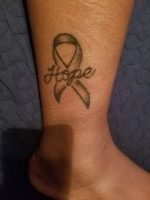
Hope Tattoo
Remembering The Journey
My journey will never be forgotten. How could it? But most importantly this tattoo is a reminder of the times when all the chips were down, and I felt like there was no end it sight. When no one understood. Hope got me through. I also found hope and encouragement through reading this book, When God And Cancer Meet.
- Published in breast cancer, Support, Uncategorized
CanCare | Providing Emotional Support
CanCare
My husband and I had the very fortunate opportunity to become volunteers with an organization called CanCare in March of 2018.
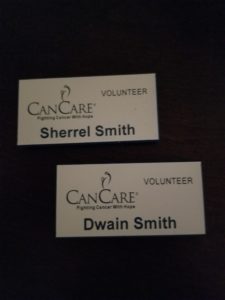
CanCare Volunteers
What Is It?
CanCare is a non-profit cancer support service. The mission is to improve the quality of life for cancer survivors and their families.
CanCare was first started in Houston, Texas. The organization now has over 600 trained volunteers. Many of these volunteers have survived cancer. The volunteers are matched with clients who are experiencing the same or a very similar cancer. Clients are also matched to volunteers based on other criteria such as; location, similar treatment, age, and gender. The volunteers represent more than 75 different cancer types.
CanCare volunteers provide one on one emotional support. This support can be by phone, text, email or in person. This support may also be once or may develop into an ongoing relationship. This is totally dependent on the client.
Caregivers
A very important part of going though the journey of cancer is the ongoing support and help of caregivers. Caregivers are often those loved ones or family members, such as a spouse, child or parent. Likewise, caregivers can also be close friends or other relatives. However, in any event caregivers need support as well. Your cancer journey can be just as difficult and emotional for your caregiver. CanCare is here to help.
Emotional Support
Unfortunately for my husband and I, we did not learn about CanCare during OUR journey. Once we learned of the organization we immediately knew we wanted to give back in this way. We wanted to help other families get through the journey by being that listening ear and glimmer of hope. As volunteers, we know how beneficial it would have been to have someone support us during this journey. Make no mistake we had the support of our family during such a tough time. In light of that, what was missing was the support of someone who had actually been on our same journey firsthand.
Like myself, my husband was not interested in support groups. We did not want to sit in the room of other like ourselves comparing stories. Nonetheless, many people find that support groups meets their need. On the contrary, CanCare is different since it provides one on one support
Get Involved
Through CanCare, my husband and I are now blessed to be able to support five people, to date, on their journeys.
CanCare is a self referral program, therefore if you or someone you know has been diagnosed with any type of cancer, please encourage them to reach out to CanCare. Likewise, if you know someone who is a caregiver to someone diagnosed this cancer, encourage them to reach out to CanCare as well. Emotional support goes a long way and can often help survivors and caregivers get through the physical challenges a little better.
- Published in breast cancer, Support, Uncategorized
Race For The Cure
Race For The Cure
On September 22, 2018 the annual Susan G. Komen Race For The Cure, was held in Charleston, South Carolina. The Race For The Cure is held annually in support of breast cancer awareness, research, education, and advocacy. The race itself is actually a series of 5K runs and walks. The Race For The Cure is an opportunity to show your support of family and friends who have been diagnosed with breast cancer. In addition to showing support, it is also a good way to learn more about the disease, above all.
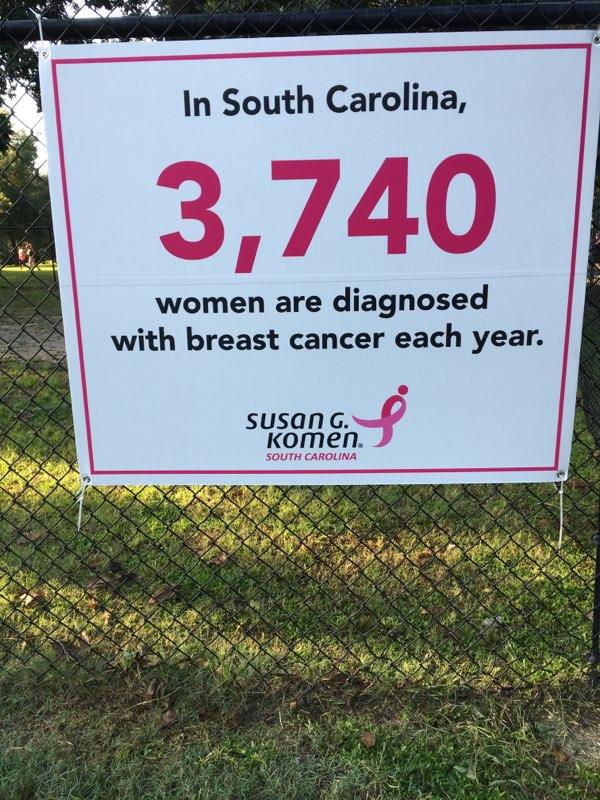
Facts
History
The Race For The Cure was started in 1983 with 800 participants in Dallas, Texas. Over the years the movement has spread globally to more than 1.6 million participants across four continents. This year it is expected that there will be 140 races globally. Although events are unique in each country, however they all share the same goal.
This year, as well as the past 2 years, I have had the honor to participate alongside my family, in the Race For The Cure. Like every year, it is heart filling to be amongst a sea of pink shirts and pink ribbons, gathered together for one cause. Moreover, it is a reminder of the battle that myself and so many other courageous women also fought.
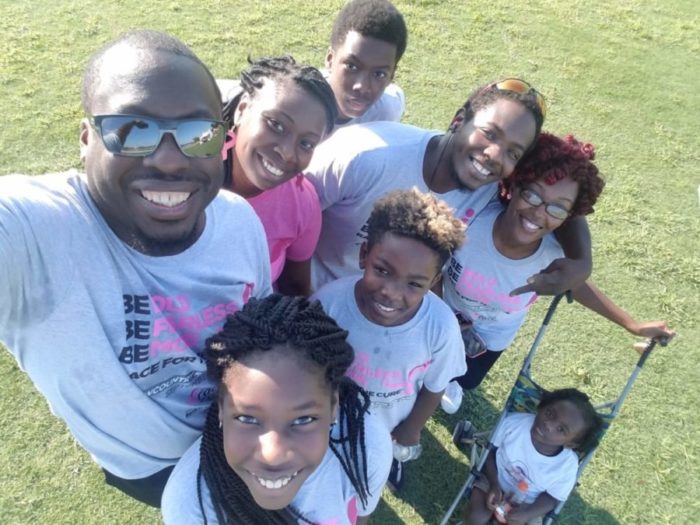
Family Support
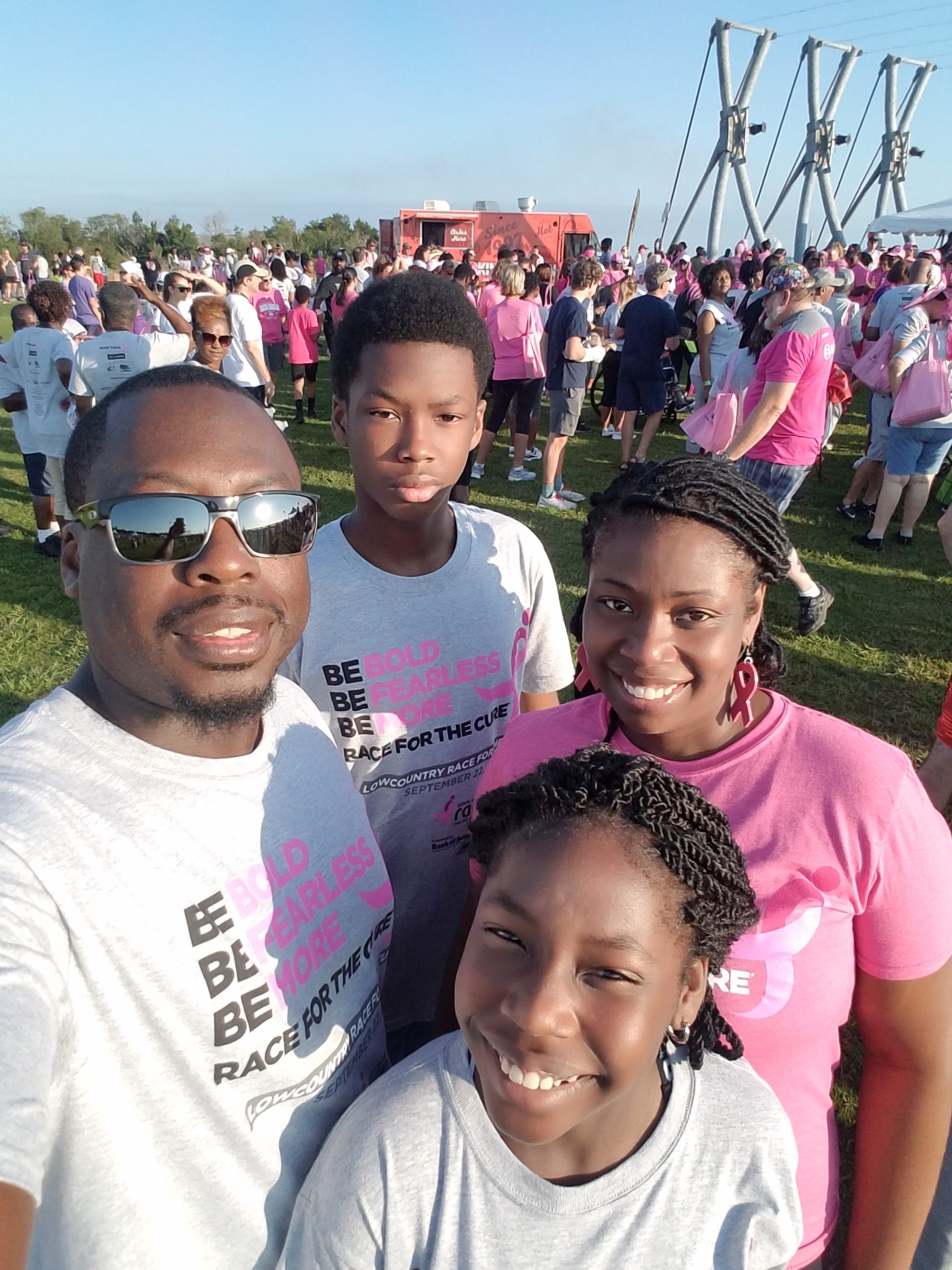
Find a race in a city near you to show your support for breast cancer. Every two minutes a woman is the US is diagnosed with breast cancer. Furthermore remember that one in eight women will be diagnosed with breast cancer in their lifetime. Become educated. Learn about the disease, so that you are aware of your risk factors.
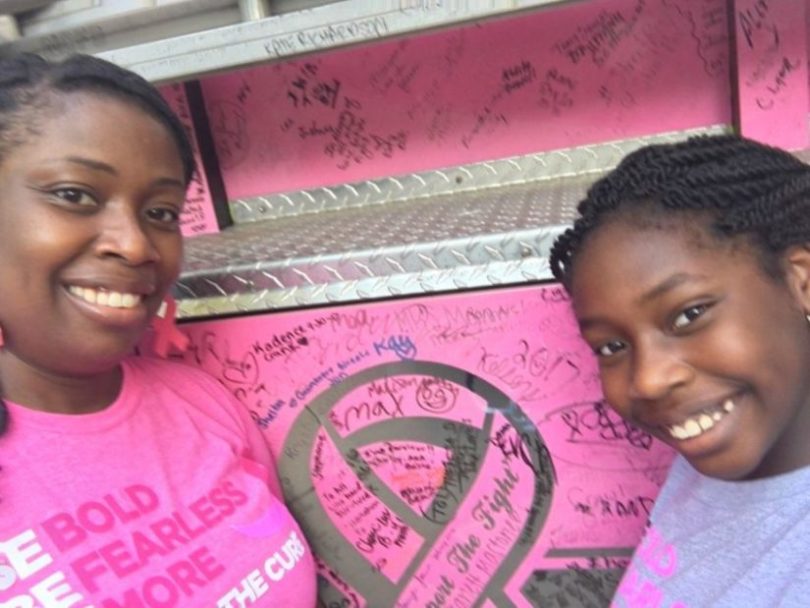
Pink Fire Truck
- Published in breast cancer, breast cancer awareness, Support, Uncategorized
Breast Cancer Support | What To Say When You Don’t Know What To Say?
Breast Cancer Support
How do you show your support after a breast cancer diagnosis? What do you say when you don’t know what to say? Until I was faced with my own journey, I never realized quite how delicate the topic can be.
So your loved one or close friend had been diagnosed with breast cancer. You want to be supportive and you want them to know that you are there for them. What are the right words to say? Most importantly, what words should you avoid? The answer is simple, yet complicated. Everyone’s response to their diagnosis is unique. Some may experience the grieving process where they are in denial at first, some may be totally devastated, while others, may have a sense of peace. This is not all inclusive, as many people will have all these feelings, at some point, like me.
So what do you say? My personal advice is to first be OK with saying nothing and just being there when needed. Some people feel that they have to say something encouraging. Encouragement is always helpful, and seems simple but I learned during my journey that what may be encouraging to the sender wasn’t always encouraging to me. I would like to first share those things that helped encouraged me during my journey. Then I will share those comments that weren’t helpful at all.
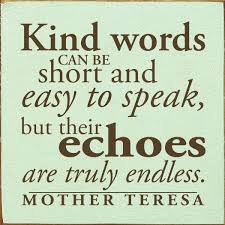
5 Things That Were Most Encouraging
1-Regular text messages
I had 4 people in my life that would send me a message of encouragement on EVERY chemo day. Though I dreaded going to my chemo treatments, I looked forward to my Wednesday messages.
2-People that let me vent
Often times I did not need anyone’s advice, nor their opinion. Sometimes, I just wanted to vent. I was angry and frustrated and wanted to let that out. I also enjoyed time to share my story and experience, once I was ready.
3-People that allowed me to cry
Those were tears of sadness, despair, and often times discouragement. I just wanted to let them out. As unhealthy as it sounds, I wanted permission to have a pity party (briefly) and not feel like I was weak, or not holding it together.
4-People that didn’t debate my decision or feelings
As mentioned, I didn’t seek much advice or opinions. What I was feeling was my perception, therefore my reality. I had periods of irrational thinking, where I wanted to stop treatments, or even change my treatment plan. But there were also some decisions that not everyone agreed with, like me decision to not have a bilateral mastectomy. I needed that ability to make decisions without judgement. There were times when I felt defeated and really sick, and I appreciate those people who just listened and sympathized with my feelings.
5-Meals
I didn’t appreciate the meals at first because I had no appetite and food was the last thing on my mind. But having meals for my family relieved some burden. Our church family was extremely helpful in this area. I even had friends that gave gift cards to fast food restaurants. Likewise, those were equally helpful. Especially on those days where my doctors appointments and chemo treatment took up an entire day. It was easy to grab a pizza for dinner on the way home. If you don’t know what to do to show support, drop a gift card in the mail, those were some of my most pleasant surprises.
5 Not So Helpful Comments and Feedback
1-Being told I was strong
As crazy as that sounds, when I was at my weakest point, the last thing I wanted to hear was that I was strong. What did that mean anyway? I could not think of another instance in my life where I had to pull on the strength that was needed to get through cancer. To me, the strength was not there at all. I had never experienced anything as hard to deal with as cancer.
2-Being told I should wear a bald head, with no wig
Losing my hair was debilitating enough. There was absolutely no way that I was going out in public with a clean head. To me the baldness reminded me of the struggles that I was facing and a chapter in my life that I did not want to be in. Yes, there are a lot of people with no hair who embraced it. I wasn’t one of them.
3-Being told that I looked good
Although I know it was intended as a compliment, it wasn’t always received that way. I often felt that it was expected that I would look bad. In spite of the fact that the outward appearance may not have looked it, the inside was totally torn apart. I felt way worse than I looked.
4-Being told they heard there was a cure for cancer
This almost made the top of the list. These comments literally made me want to explode. I would love for there to be a cure for cancer. It was just hard for me to believe that there was a cure out there and my oncologist and other doctors were holding out on me.
5-Being told about other people who had cancer
Hearing of other peoples diagnosis initially made me very sad. It was hard to hear of so many peoples lives being turned upside down like mine. Stories with good outcomes were sometimes uplifting, but not always.
It is hard to watch your loved one or friend suffer. One of the most important things you can do it just listen and be there. Offer specific help rather than the opened ended offer of “let me know if you need anything”. If they are like me, we are likely to seek out help. Expect an array of emotions, and don’t pass judgement. Allow for privacy. While I felt open with my diagnosis and talking about it, I was very private when it came to doctors appointment and chemo treatments. I only felt comfortable with my immediate family present, as those appointments often brought out emotions that I did not always want to share openly.
Everyone is different in the way that they respond to their diagnosis. Listening to your loved ones or friends needs, and just binge there for support, goes a long way.
- Published in breast cancer, Support
